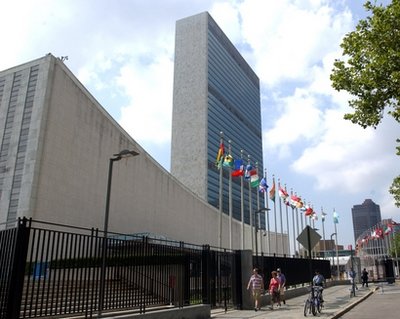Global General
Multimillion-dollar UN corruption case uncovered
(Agencies)
Updated: 2010-03-19 10:08
 |
Large Medium Small |
|
 This July 27, 2007 photo shows the United Nations headquarters building. [Agencies] |
UNITED NATIONS - The deal looked simple enough: US military equipment suppliers bribed an African defense minister's salesmen to secure part of a $15 million gig to outfit a presidential guard.
But the salesmen were actually FBI agents. And the operation resulted in what US authorities in January called their biggest foreign bribery sting to date, netting 16 indictments and 22 arrests of small arms and military equipment makers.
At the center of the US case is Richard Bistrong, a former Florida executive who first surfaced in a series of cases of bribes and bid-rigging for multimillion-dollar UN peacekeeping contracts. The trail to Bistrong is laid out in UN documents, e-mails and legal filings reviewed by The Associated Press.
The story of Bistrong and the military equipment suppliers shows how vulnerable the United Nations is to corruption in how the billions of dollars a year that it oversees are spent. It also raises questions about how well that spending will be monitored in the future: The anti-corruption unit that first uncovered the bribery and bid-rigging was disbanded in 2008, after more than 300 investigations in three years.
"It is greatly disturbing that an organization plagued by corruption and mismanagement would disband its anti-corruption task force," said US Rep. Ileana Ros-Lehtinen of Florida, the ranking Republican on the House Foreign Affairs Committee, who has proposed requiring the UN to do more to fight corruption or risk losing US financial support. "What will the (Obama) administration do to address US taxpayer dollars being misappropriated, squandered, and stolen at the UN? We need to demand concrete reform now."
Bistrong is a former executive for military equipment supplier Armor Holdings of Jacksonville, Florida. The Justice Department charged him in January with bribing foreign officials to outfit UN peacekeepers with $6 million in ballistic body armor and helmets. He was charged with cooking the books between 2001 and 2006 to obscure $4.4 million in payments, including $200,000 in kickbacks to one intermediary, to get the contracts.
Bistrong also was accused of paying $15,000 in bribes to a Dutch agent after obtaining a $2.4 million pepper spray contract from the National Police Services Agency of the Netherlands, and with providing kickbacks to an election official in Nigeria to get a contract to provide fingerprint ink pads to Nigeria's Independent National Election Commission.
Court papers say Bistrong had help from unindicted co-conspirators who are described but not named. However, they are named in documents by the UN Procurement Task Force, the former anti-corruption unit that set in motion the US case.
In 2006, the task force identified an obscure marketing company, IHC Services Inc., with offices in midtown Manhattan and Milan, Italy, that seemed unusually successful at securing lucrative UN contracts for its clients.
Task force investigators then discovered the secret to the company's middleman role: It partnered with a corrupt UN procurement official, Alexander Yakovlev, to arrange for companies to win contracts by obtaining confidential UN documents and providing preferential treatment to certain favored vendors represented by IHC.
For example, officials from Cyprus-based food rations supplier Eurest Support Services flew to New York to conduct what the task force described as an elaborate bid-rigging operation. In a hotel suite just blocks from UN headquarters, Eurest officials, with the help of IHC and Yakovlev, doctored bids for UN contracts by first securing their competitors' confidential proposals, according to task force records such as e-mails, phone records, store receipts and the statements of two confidential informants who took part in the bid-rigging.
The next month, Eurest won a $62 million UN contract in Liberia and a $24.4 million UN contract in Eritrea. Those were among $234 million in contracts the UN had awarded the company to supply food rations to peacekeeping forces since the early 1990s.
Neither IHC nor Eurest were charged with crimes, but Eurest's new owner, Britain's Compass Group, settled competitors' lawsuits for about $74 million, while not admitting liability.
Compass said at the time that it believed the problems did not extend beyond the behavior of a few individuals, and it had taken disciplinary action.
The task force then focused on Bistrong, Armor and other companies securing UN contracts with help from IHC and Yakovlev.











